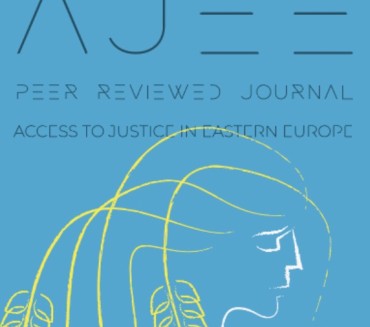Summary: 1. Introduction. – 2. Consolidated enforcement proceedings: legal nature and regulatory certainty. – 2.1. The current state of legislative regulation of consolidated enforcement proceedings and the practice of its application. – 2.2. Legislative prospects for the development of the institute of consolidated enforcement proceedings. – 3. Appeals against decisions, actions, or omissions of executors: jurisdictional affiliation and legal certainty. – 4. Conclusions.
-
This article was prepared as part of the scientific project ‘Justice in the context of sustainable development’ Project No. 22BF042-01 (2022-2024).
Background: This legal analysis examines the current legislation in the field of legal regulation of some institutes of enforcement of decisions and draft l aws. It demonstrates modern trends in the development of legislation in this sphere and addresses problematic aspects related to the legal regulation of consolidated enforcement proceedings and legal regulation of the specifics of appeals against decisions, actions, or inaction of executors. The declared aim is to form a sustainable justice system in Ukraine, which fosters a peaceful and open society, ensures access to justice for all and creates effective, accountable institutions with broad participation on all levels. Scientific approaches to solving these problems are highlighted.
Methods: To achieve the research goals , general scientific and unique methods of scientific research were applied, such as comparative-legal and semantic-structural methods, prognostic method and grouping, analysis, synthesis, and generalisation.Results and Conclusions: Two key problematic aspects of the legal regulation of consolidated enforcement proceedings are the lack of a definition of the term ‘consolidated enforcement proceedings’ in it and the absence of a defined mechanism for the transfer of enforcement proceedings, which complicates their application in practice. It has been concluded that the gaps in the legislation should be addressed at the legislative level and not remain subject to judicial lawmaking, as the judicial practice is unstable. Moreover, it should be in accordance with the requirements of European institutions in the sphere of enforcement proceedings, according to which national legislation should contain a clear definition of the conditions for enforcement and the statutory enforcement provisions should be set out clearly, avoiding the possibility of misinterpretation. A legal analysis of draft laws in the institute of consolidated enforcement proceedings was carried out. It has been established that the shortcomings of the legal regulation of the institute of consolidated enforcement proceedings, which remain unresolved, are the lack of a legislative definition of the legal category ‘consolidated enforcement proceedings’ , as well as the lack of clear, legal certainty regarding the procedure for the transfer of enforcement proceedings against a single debtor, opened by the state enforcement officer and private executors or only private executors. Considering the performed legal analysis, a definition of ‘ consolidated enforcement proceeding’ is proposed. A discrepancy has been identified between the Law of Ukraine ‘On Enforcement Proceedings’ and the procedural codes regarding determining the list of subjects entitled to appeal and the appropriate court for filing such an appeal . It has been proven that such legal uncertainty provokes complications in realising the interested person’s right to an effective means of legal protection. A legal analysis of draft laws, regarding the improvement of the institution of appeals against decisions, actions or inaction of executors, was carried out. It was noted that these draft laws intend to eliminate several significant shortcomings of legislation in this area, as well as at the prospective introduction of the institution of pre-trial dispute settlement in this category of cases. However, they also contain some debatable issues, as well as unresolved defects of legislation in the field of enforcement of decisions regarding the legal uncertainty of issues of judicial jurisdiction surrounding appeals against decisions, actions or inaction of executors in consolidated enforcement proceedings. Considering the legal analysis carried out, a specific vision for the elimination of conflicts between special and procedural legislation regarding the regulation of the features of appealing decisions, actions or inaction of executors is proposed.

